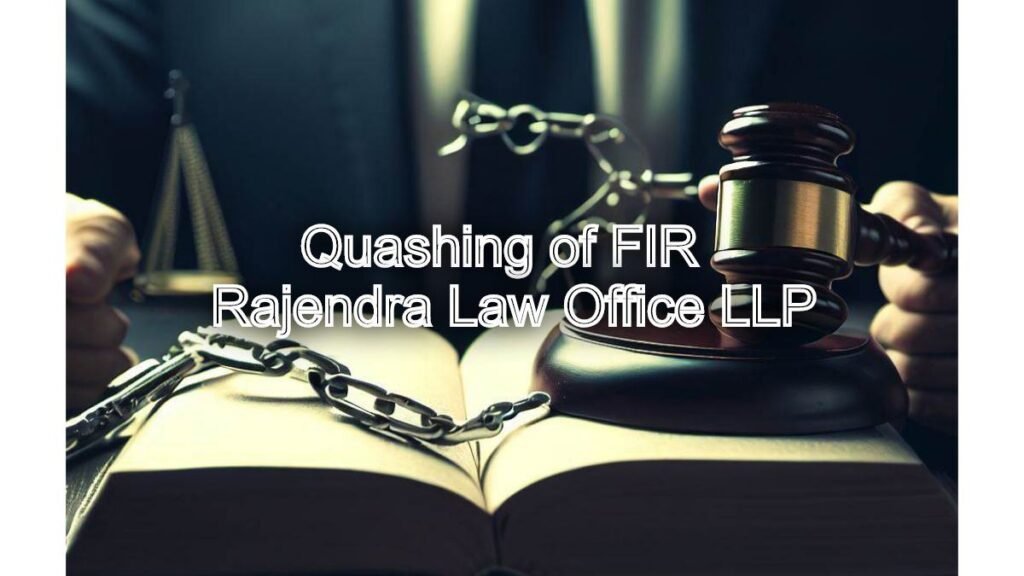Quashing of FIR: The filing of a First Information Report (FIR) marks the commencement of a criminal investigation. However, in certain circumstances, an FIR may be filed maliciously or without sufficient grounds. In such instances, the legal remedy available to an aggrieved individual is to seek the quashing of the FIR. This article will delve into the crucial guidelines laid down by the Supreme Court of India regarding the quashing of FIRs and examine relevant case studies. Furthermore, we will explore the expertise of Rajendra Law Office LLP in navigating the complexities of quashing proceedings.
Quashing of FIR: Supreme Court Guidelines and Case Studies: Rajendra Law Office LLP
Understanding the Concept of Quashing an FIR
The power to quash an FIR is inherent in the High Court under Section 482 of the Code of Criminal Procedure, 1973. This power can be exercised to prevent the abuse of the judicial process and to secure the ends of justice. Importantly, the Supreme Court has consistently emphasized that the power to quash an FIR should be exercised sparingly and judiciously.
Supreme Court Guidelines for Quashing FIRs
The Supreme Court has issued several landmark judgments that have significantly shaped the contours of quashing proceedings. Notably, the Court has emphasized the following key considerations:
- Frivolous and Vexatious FIRs: The Court has consistently held that FIRs filed with malicious intent or solely to harass an individual can be quashed.
- Absence of Prima Facie Case: If the allegations in the FIR, even if taken at face value, do not disclose any cognizable offense, the Court may consider quashing the FIR.
- Compromise Between Parties: In certain cases, where the parties have amicably resolved the dispute, the Court may consider quashing the FIR, particularly in cases involving private wrongs.
- Abuse of Process: The Court may quash an FIR if it is evident that the process of law is being abused for collateral purposes, such as to exert undue pressure or to settle scores.
Case Studies: Illustrative Examples
Several landmark judgments have provided valuable insights into the application of these guidelines. For instance, in the case of State of Haryana v. Bhajan Lal, the Supreme Court emphasized the need to carefully scrutinize the facts and circumstances of each case before exercising its power to quash an FIR.
Similarly, in R.P. Kapur v. State of Punjab, the Court held that the power to quash proceedings should be exercised sparingly and only in exceptional circumstances.
Conversely, in cases where the allegations in the FIR are manifestly false or where the investigation has been conducted in a grossly unfair manner, the Court has readily exercised its power to quash the proceedings.
Rajendra Law Office LLP: Navigating the Complexities
Quashing an FIR requires a deep understanding of legal principles, procedural nuances, and the relevant case law. Rajendra Law Office LLP, with its team of experienced criminal lawyers, provides comprehensive legal assistance to clients seeking to quash FIRs.
Our expertise encompasses:
- Thorough Legal Analysis: We meticulously analyze the FIR, the allegations therein, and the applicable legal provisions.
- Strategic Case Building: We meticulously gather evidence, prepare compelling legal arguments, and draft persuasive petitions to support the quashing application.
- Representation Before Courts: We represent clients before the High Court and other relevant forums, advocating persuasively for the quashing of the FIR.
- Personalized Approach: We understand that each case is unique. Therefore, we adopt a personalized approach, tailoring our strategies to meet the specific needs and circumstances of each client.
Frequently Asked Questions
An FIR (First Information Report) is the first step in a criminal investigation.
An individual may seek to quash an FIR if it is: Filed maliciously or without sufficient grounds.
Based on false or fabricated allegations.
Used to harass or intimidate the individual.
An abuse of the legal process.
Frivolous and vexatious FIRs.
Absence of a prima facie case.
Compromise between the parties.
Abuse of the process of law.
The Supreme Court has issued crucial guidelines on quashing FIRs, emphasizing that this power should be exercised sparingly and judiciously.
Landmark judgments have provided valuable insights into the application of these guidelines.
Thorough legal analysis of the FIR and applicable laws.
Strategic case building, including evidence gathering and legal argument preparation.
Representation before courts to advocate for the quashing of the FIR.
Personalized approach tailored to the specific needs of each client.
No, this article is for informational purposes only and does not constitute legal advice.
It is crucial to consult with a qualified legal professional for advice on your specific legal needs.
Conclusion
The quashing of an FIR is a complex legal process that requires careful consideration and strategic legal maneuvering. By adhering to the guidelines laid down by the Supreme Court and employing a nuanced and strategic approach, individuals can effectively challenge baseless or malicious FIRs. Rajendra Law Office LLP, with its team of skilled and experienced criminal lawyers, stands ready to assist clients in navigating the complexities of quashing proceedings and securing favorable outcomes.
Read More
- Divorce Attorneys in Chennai: Expert Legal Solution and Support 📊
- The Role of the Supreme Court in Upholding Fundamental Rights in Criminal Law 🏛️
- Property Rights of Women in Divorce: Supreme Court Clarifications 👩⚖️
- Expert Bail Lawyers in Chennai – Fighting for Your Rights ⚖️
- How to File a Complaint Against a Government Officer in India?
- Supreme Court of India Website:

